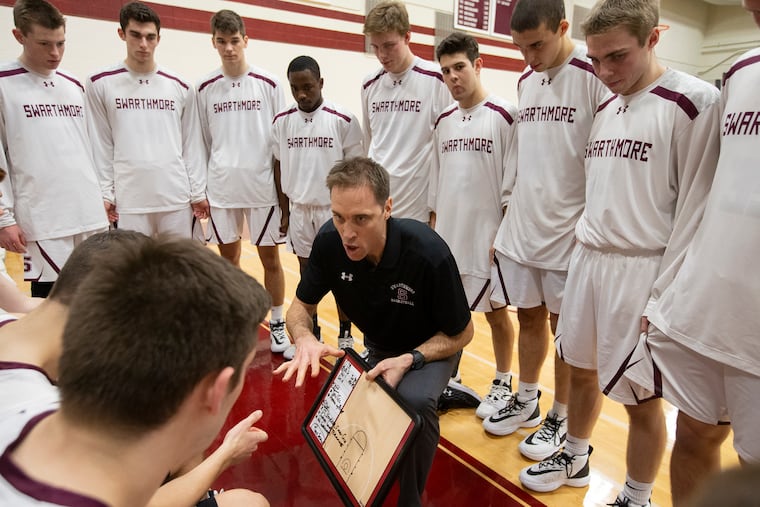When will we see Swarthmore hoops again? Not this academic year | Mike Jensen
The nation’s top-ranked NCAA Division III team didn’t get a chance to prove itself in the 2020 tournament. It won't get another chance until the 2022 tourney.

The news came this week and it was what Swarthmore men’s basketball coach Landry Kosmalski had expected, pretty much to the word. Friends saw it and texted what amounted to condolences.
Kosmalski, however, wasn’t grieving a season he hadn’t expected to see.
“I didn’t bat an eye on this,” Kosmalski said Wednesday morning.
Kosmalski certainly wasn’t cheering the news that Swarthmore won’t have a 2020-21 basketball season, that there will be no intercollegiate sports on campus for the entire academic year. This news was officially announced on Tuesday.
Swarthmore’s plan includes having freshmen and sophomores on campus for the fall semester, then juniors and seniors for the spring. If the COVID-19 landscape improved, there was a hope for everyone to be back. But that’s not the landscape the college sees right now.
“Basic math — you really can’t play basketball with six guys,” Kosmalski said of only having half his team on campus at a time.
Kosmalski didn’t bat an eye because he hadn’t allowed himself to think there was going to be a quick fix. He’d prepared his team accordingly.
“Many have taken leaves of absence this semester,” Kosmalski said. “They’ve made plans, basically for the year.”
On the scale of things impacted by COVID-19, a basketball season doesn’t even make the list when you’re talking about lives lost and jobs gone, the overall impact on society. But this is the sports page and this is, in fact, a loss — the nation’s top-ranked NCAA Division III team didn’t get a chance to prove itself in the 2020 tournament, canceled for good. And now there will be no 2021 March Madness for this group. March of 2022, 17 months from now, is the next time Swarthmore can play a postseason game.
While Swarthmore as an institution has put resources into athletics in recent years, the announcement about the spring plan put out this week didn’t even mention athletics. It was just a given apparently. The athletic department put out its own separate notice.
Kosmalski isn’t saying that Swarthmore’s plan is the right one for all schools. He feels lucky to be at a place that isn’t as beholden to tuition to keep the doors open. Also, Swarthmore students, way up the list of academic achievers, probably have more options if they’re taking a year off, even during a pandemic.
West Chester was the first local college to announce no winter or spring sports, but then quickly backtracked last week, under some political pressure. The school will further study testing and housing protocols, then the Pennsylvania State Athletic Conference as a whole will vote on sports for the spring semester, probably at its November meeting.
Costs of testing kept some area small-college football leagues from playing. That’s still an issue for winter and spring sports.
Talking to friends who are Division I coaches, Kosmalski said, “The uncertainty is kind of making it miserable for them.”
Meaning that dealing with protocols and testing and scheduling and the rest of 2020 life still doesn’t guarantee that a game on a given scheduled day will come off as planned.
“As coaches, I think we’re pretty adaptable within a game,” Kosmalski said. “Not knowing if we can practice, being thrown off your whole plan, is really tough for us.”
Kosmalski immediately pivoted. He won’t play the victim.
“By the same token, we’ll gladly make that sacrifice,” he said of not playing, “even though it’s taken away one of our passions for a year, if it slows the spread for our community and the greater local and national community.”
Since this pandemic demands looking at so many angles, Kosmalski isn’t trying to judge any other decisions. At first, he wasn’t sure about big-time college football being played.
» READ MORE: Episcopal Academy grad Conner Delaney the hero for Johns Hopkins in knocking off undefeated Swarthmore | Mike Jensen
“By the same token, a lot depends on them,” Kosmalski said of Southeastern Conference football, for instance. “If there’s a way they can make it work and safe, then I think they should.”
Some of his Swarthmore players have been able to find jobs, working virtually, while some are also taking online classes. Three basketball players were on campus this fall, part of a big 18-player roster. One senior is planning to finish up virtually in the spring and graduate.
“They’re navigating the unknown,” Kosmalski said.
It’s been that way since March, back when it seemed eye-opening that parents weren’t allowed to see their children play in the first round of the NCAA Division III tournament at some venues. That inconvenience almost seems quaint now.
“It’s just been an absolute avalanche of uncertainty,” Kosmalski said.
His program, for one, now has a little less of it. Unfortunately.